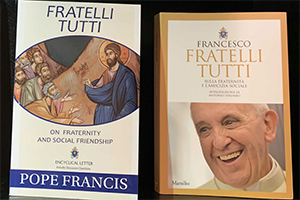
CFRPJ hosts examination of third Papal encyclical
Imagining a More Just World After Covid-19: An Evening in Conversation with Fratelli Tutti
By Paul SinkewiczThe newly established Centre for Faith, Reason, Peace, and Justice (CFRPJ) hosted an online event recently in collaboration with the Western Conference for Social Justice.
Imagining a More Just World After Covid-19: An Evening in Conversation with Fratelli Tutti attracted more than 70 attendees to take up an examination of the third encyclical letter from Pope Francis.
Dr. Chris Hyrnkow, Director of the CFRPJ at St. Thomas More College, hosted the meeting while Tashia Toupin, Social Justice Coordinator for the Archdiocese of Regina, served as facilitator.
The event, held March 2, consisted of a moderated, interdisciplinary panel that included Dr. Peter Baltutis, Dr. Susanna Barnes, Georgina Jolibois and Dr. David McGrane.
Dr. Baltutis is an associate professor of History and Religious Studies at St. Mary’s University in Calgary. His research focuses on the historical and theological development of Catholic social thought and action in Canada.
He gave a birds-eye view of Pope Francis’ third papal encyclical to help frame the discussion of the document the title of which means ‘All Brothers’. He explained Saint Francis of Assisi was being held up as an exemplar of how to live a life of fraternity and social friendship.
“Specifically, he points out that St. Francis lived a life in right relationship not only with all people, but also right relationship with all creation. So that’s the model we are called to aspire to,” said Baltutis.
“So, the hallmark of this new Christian society that we are all called to build, is we are called to live in a way that transcends boundaries: geographic boundaries; economic boundaries; racial boundaries; religious boundaries. All boundaries are to be transcended.”
Baltutis said the very event at which he was speaking was an example of the work being called for by the encyclical.
“This panel is what Pope Francis wants -- for religion to not be speaking in a silo to other theologians, but religion in dialogue with social scientists, with politicians, and with the people on the ground. So, tonight is a great model of what Fratelli Tutti is all about.”
The second panelist was Dr. Barnes, an anthropologist and the USask representative on the advisory committees for Peace Studies and Catholic Studies.
She reflected in particular on Chapters 4 and 5 of the encyclical from an anthropological viewpoint, and explored what it asks of us in envisioning and enacting a more just post-pandemic world.
She said there are many critical lessons to be drawn from Fratelli Tutti.
“For me the most important one is that we are all inter-connected,” said Barnes. “And we must understand that collectively, we make the world. Understanding this helps us understand that collectively we can also make the world differently, and we can work on opening our hearts and our minds towards a flourishing of all people in creation.”
STM professor Dr. David McGrane spoke next from the perspective of a political scientist and read Fratelli Tutti as a work of political philosophy.
He identified two main recurring themes in Fratelli Tutti:
“What I think he’s saying … is that a post-Covid world needs more collectivism and less free market liberalism, and that a post-Covid world needs more cosmopolitanism and less xenophobic nationalism.”
Jolibois is a Denesuline woman and the mayor of La Loche, as well as a former Member of Parliament. She spoke of the need to commit to public service and to follow the guidance of Pope Francis to think outside of one’s self.
She related how the examples set by the Oblate priests and Grey Nuns in her past played a critical role through their modelling in shaping her perception of public service.
“It’s about the human connection,” she said. “Here in this time and age we are challenged because of Covid. Covid has broken many things for us: the connections that we would make with our friends and families and communities.”
She is hoping the pandemic crisis will be a catalyst for improvements in the experiences of indigenous people in the future as new connections are forged and that society can start afresh and really focus on the meaning of reconciliation.
She said building relationships is building hope.
In his response to the panelists, Archbishop Murray Chatlain, of the Roman Catholic Archdiocese of Keewatin - Le Pas, said that one of the lines in Fratelli Tutti that most resonated with him is the call by Pope Francis that we need to do better.
“I think all of us are on this call because we share that (feeling),” he said.
After breaking up into smaller groups to discuss the presentations and the keys questions that arose from them, the group reconvened to further discuss the encyclical and the challenges of the post-Covid world a better place.
The entire event is available to watch online HERE.
To read Fratelli Tutti, please click HERE.
